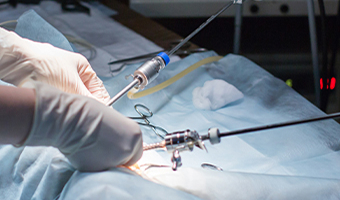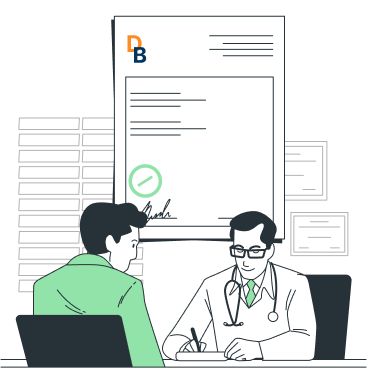Our Doctors for Laparoscopy

Dr. Mainak Paul
Laparoscopic Surgeon
12+ years of experience
Piles, Fistula, Fissure, Laparoscopic Cholecystectomy, Laparoscopic Appendectomy, Abdominal Emergency, G.I. Malignancy Operation

Dr. Mainak Paul
Laparoscopic Surgeon
12+ years of experience
Piles, Fistula, Fissure, Laparoscopic Cholecystectomy, Laparoscopic Appendectomy, Abdominal Emergency, G.I. Malignancy Operation
What is Laparoscopy?
Laparoscopic Surgery refers to a minimally invasive procedure that involves the use of a small incision to perform the surgery. During the surgery, a thin tube with a laparoscopy (small camera) is inserted in the abdomen through the incisions. This enables the laparoscopy doctor to check and operate on the organs present inside the body without making large cuts. As per the latest statistics of 2023, the total number of laparoscopic surgeries performed globally was 15.2 million. More advancements in laparoscopy surgery will make this number grow even more in the upcoming years.
Our Laparoscopy Focus Areas

Appendicitis
Appendectomy is a surgery that is performed to remove an infected or inflamed appendix. Appendicitis doctors usually suggest this procedure to patients suffering from acute appendicitis as this condition tends to advance more quickly. Individuals with acute appendicitis face a significant risk of their appendix rupturing.This may cause the infection to spread to other parts of the body, which can prove to be deadly. In cases of chronic appendicitis, the pain is not much severe, hence surgery is advised as per the patient’s condition.
Know More1.jpg)
Gallstone
Gallstones are solidified deposits of bile that can form in the gallbladder. Bile, a digestive fluid produced by the liver and stored in the gallbladder, is released into the small intestine (duodenum) when the gallbladder contracts as you eat. Gallstones can vary in size from tiny grains of sand to as large as golf balls. Some individuals may have a single gallstone, while others may develop multiple stones simultaneously. If gallstones cause symptoms, they often require surgical removal of the gallbladder. However, if gallstones are asymptomatic and don't cause any problems, non surgical gallbladder treatment is needed.
Know More
Hernia
A hernia occurs when there is a weakness or opening in the abdominal wall, allowing soft tissue, such as fat or intestines, to push through the muscles and create a visible bulge under the skin. This causes a lump or bulge to form.
Know More1.jpg)
Inguinal Hernia
An inguinal hernia occurs when a part of the intestine or abdominal tissue pushes through a weak spot in the abdominal wall, causing a bulge or lump in the groin area. This happens usually while lifting a heavy object, coughing or bending over. This type of hernia mostly affects males. Hence, if you are suffering from this hernia, seek medical attention from an inguinal hernia laparoscopic surgeon.
Know More
Umbilical Hernia
Is your umbilical hernia causing you significant discomfort? If yes, consult our umbilical hernia surgeon and find the ultimate pain relief. Our doctors from Dactar Babu specialise in performing minimally invasive laparoscopic surgery of umbilical hernia. Reach out to us for more information regarding umbilical hernia treatment.
Know MoreOur laparoscopy focus areas

Appendicitis
Laparoscopy is used to remove the inflamed appendix, offering a quicker recovery and less postoperative pain.
Know More
Gallstone
This procedure helps remove the gallbladder when gallstones cause pain or infection, reducing the risk of complications.
Know More
Hernia
Laparoscopic surgery repairs hernias with small incisions, resulting in less discomfort and faster healing.
Know More
Inguinal Hernia
This technique is ideal for fixing inguinal hernias, reducing the likelihood of recurrence and minimizing scarring.
Know More
Umbilical Hernia
Laparoscopic repair of umbilical hernias offers a swift recovery and less postoperative pain.
Know MoreOur Patient Love Us
Frequently Asked Questions
Some diseases that can be treated by laparoscopy operation are hernia, gallbladder stone (laparoscopic cholecystectomy) or inflammation of the gallbladder, appendicitis, hydrocele and endometriosis.
Some diseases that are treated by laparoscopy surgery here include hernia, gallstone, inguinal hernia, umbilical hernia and appendicitis
The cost of laparoscopy surgery may vary based on the following factors: 1. Type of disease 2. Experience of the laparoscopy surgeon 3. Cost of anaesthesia 4. Cost of surgical items and medicines 5. Insurance coverage
According to the best laparoscopy doctors, the recovery time after laparoscopy surgery is usually two weeks or more, depending on the type of disease treated.
The procedure of laparoscopy is different from open surgery due to smaller incision size, faster recovery and minimal trauma to surrounding tissues.
A laparoscopy surgeon can diagnose and treat hernia, gallstones and many other conditions during the procedure.
The duration of a laparoscopy surgery varies based on the complexity of the procedure. Usually, it takes one to two hours to complete the surgery.
Due to the small nature of the incisions, laparoscopy surgery does not cause much pain. However, you may experience some discomfort after the procedure. The laparoscopy surgeon will prescribe pain medications to help manage the pain post-surgery.
Usually, laparoscopy doctors advise patients to refrain from eating or drinking for a few hours prior to the procedure.
Laparoscopy surgery is better than open surgery in terms of smaller incisions, reduced pain, less scarring, reduced blood loss, improved precision and faster recovery time.
Some medical instruments that are used in laparoscopy surgery include the following. 1. Laparoscope: Provides real-time images of the organs and tissues within the abdomen. 2. Needle Driver: Helps in suturing to close wounds after surgery. 3. Trocar: Creates access points for inserting other instruments into the abdomen. 4. Bowel Grasper: Grasps the abdominal tissue without the need for large incisions. 5. Surgical Mesh: Reinforces the abdominal wall to prevent the recurrence of hernias.
Laparoscopic surgeons at Dactar Babu have 10-15 years of experience in performing advanced laparoscopic treatments and the procedures offered by them have maximum success rates.
What does a Laparoscopic Surgeon do?
A laparoscopic surgeon specialises in performing surgical procedures with the help of a minimally invasive technique called laparoscopy. They make precise incisions and perform the laparoscopy procedure in a minimally invasive manner unlike in open surgery.

Benefits of Laparoscopy Surgery
The benefits of laparoscopy treatment are as follows.
1. Small incisions:
Laparoscopy operation contributes to less pain and a speedy recovery unlike open surgery due to smaller size of incisions.
2. Lower chances of complications:
Doctors make precise incisions that reduce the risk of complications like infection and blood loss.
3. Shorter hospital stay:
Patients can usually go home quickly after laparoscopy.
4.Better cosmetic results:
Due to smaller incisions, laparoscopy surgery results in less visible scarring.

What Happens During Laparoscopic Surgery?
Here is what happens during a laparoscopic surgery:
1. Preparation:
You will be advised to follow certain instructions before the laparoscopy surgery, such as avoiding certain foods or medications.
2. Anaesthesia:
You will be given anaesthesia, either general anaesthesia (putting you to sleep) or regional anaesthesia (numbs a specific area of your body).
3. Incisions:
The laparoscopy surgeon will make several small incisions in your abdomen, usually around your belly button and near your hips.
4. Laparoscope insertion:
A thin tube with a camera (laparoscope) is inserted through one of the incisions. The laparoscope has a light and a camera that allows the surgeon to see inside your abdomen or pelvis.
5. Surgery:
The laparoscopy surgeon will insert surgical instruments through the incisions to perform the procedure.
6. Closure:
Once the procedure is complete, the laparoscopy surgeon will remove the laparoscope and close the incisions with stitches.
Laparoscopy Treatments at Dactar Babu
The laparoscopy doctors at Dactar Babu provide the following treatments.
1. Hernia:
A hernia occurs when an organ or tissue pushes through a weak spot in the surrounding muscle or connective tissue, leading to a visible bulge and a sense of discomfort. Common types include inguinal and umbilical hernias.
2. Gallstones:
Gallstones are solid particles that form in the gallbladder, causing pain, nausea, or complications if they block bile ducts. They differ in size and can range from being asymptomatic to causing severe symptoms.
3. Inguinal Hernia:
An inguinal hernia happens when tissue protrudes through a weak spot in the abdominal wall or inguinal canal, often leading to a bulge in the groin area. It is more common in men and can cause pain or discomfort.
4. Umbilical Hernia:
An umbilical hernia occurs when part of the intestine or other tissue pushes through a weak area near the belly button. It is generally seen in newborns but can also affect adults, often causing a visible bulge and discomfort.
5. Appendicitis:
Appendicitis is the inflammation of the appendix, usually resulting in sudden abdominal pain, nausea, and fever. If untreated, it can lead to a serious infection or rupture, requiring medical attention.
How to book an appointment with Laparoscopic Surgeons at Dactar Babu?
To book an appointment with laparoscopic doctors at Dactar Babu, you can follow any one of these steps
1. Call us: Dial +91-8961621666 to start the appointment booking process.
OR
2.Send SMS/WhatsApp: Message or WhatsApp us at +91-8961621666.
OR
3.Fill Up Our Form: Fill up the appointment form with all the required details through our online doctor booking platform (https://www.dactarbabu.in/).
Get in Touch
Tell us about your disease and Dactar Babu will get the best treatment option for you.






